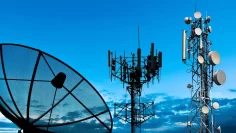
A prototype Kuiper satellites by Amazon is operating successfully
UNITED STATES, Nov. 17 – Amazon’s two prototype satellites in orbit for the company’s Kuiper internet network have been operating successfully according to a statement by the company on Thursday, this place the company’s projection for launching operational satellites by mid-2024 on track.
Amazon Kuiper internet network is prepared to compete against Starlink owned by billionaire Elon Musk, which presently is the world’s largest satellite operator for the provision of broadband internet service worldwide to government, clients and organizations.
According to the statement by Amazon, the company within the first 30 days of launch of the prototype satellites from Florida aboard an United Launch Alliance Atlas 5 rocket, it had achieved a 100% success rate. The company said it used the prototype satellites for short two-way video calls, streaming a high-definition movie on Prime Video and ordering items off Amazon’s website.
The Vice president of technology for Project Kuiper, Rajeev Badyal, said “We still have a lot of hard work ahead, and scaling for mass production won’t be easy.”
The government of the United States through the Federal Communications Commission has required that by 2026 Amazon should distribute half of its over 3,000-planned satellite constellation.
According to Badyal who spoke to Reuters, he said after recording this huge success with the prototype tests, Amazon expects to start gathering production-ready satellites next month for a launch in the second quarter of 2024. Though the media giant claimed that Badyal declined to say how many satellites Amazon would launch per rocket.
“Badyal said he expects the network will be capable of providing broadband coverage in some parts of the world by late 2024, for an early beta phase targeted to begin in early 2025.
“Early partners like Vodafone and Verizon are set to become the first telecom firms to beta test the service.” Reuters added.
In 2022 Amazon announced a bulk launch deal for 83 launches, the largest procurement of commercial rocket eve, from different rocket companies, like Blue Origin owned by Jeff Bezos, ULA and Europe’s Arianespace.
Different business opportunities are eminent for Kuiper Satellites, the Boeing-Lockheed joint venture United Launch Alliance is ready to loft the initial various batches aboard its Atlas 5 and the company’s upcoming Vulcan rocket.
On the other hand, the competitor, Elon Musk’s Starlink uses its own in-house SpaceX Falcon 9 rockets to launch its network, which since 2019 has grown to roughly 5,000 satellites in low-Earth orbit, making it easy for near-global broadband coverage.
The competition between Kuiper and Starlink will create a favourable platforms for clients, governments and companies all over the world to make good choices of their internet provider which will help to reduce monopoly and provide better alternative to the conventional internet services which presently is not meeting the demands of users in terms of quality and efficiency










